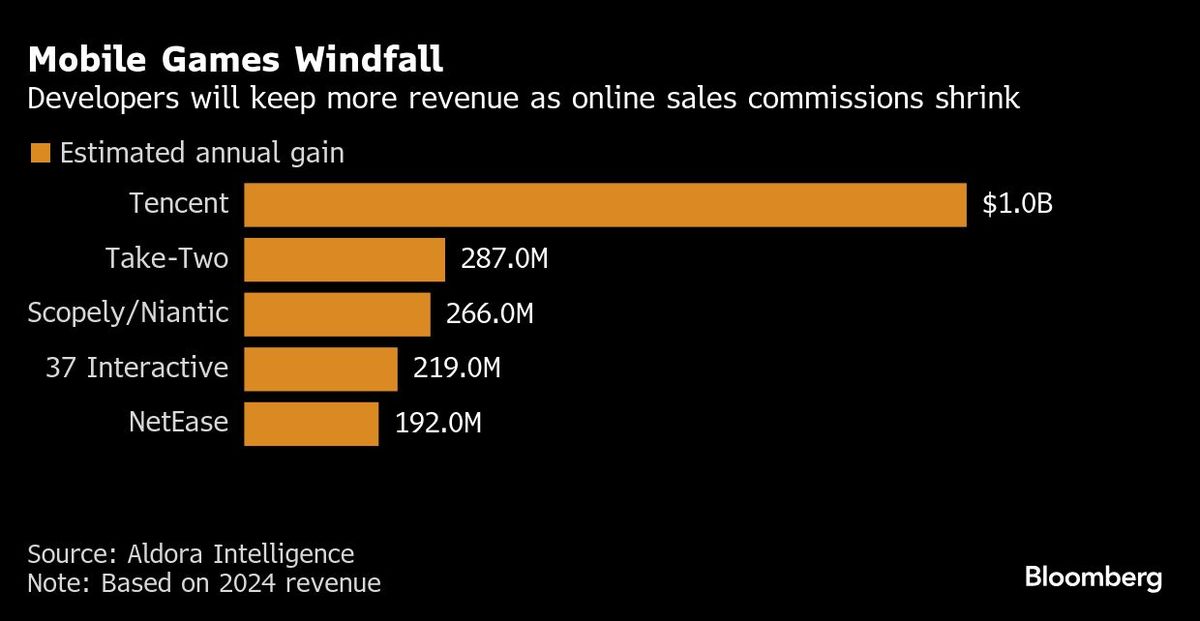
Mobile-game makers poised for windfall following win over Apple
(May 30): Mobile-game developers may reap billions of dollars more in revenue this year as a result of a court ruling freeing them from rules imposed by Apple Inc’s App Store.
Aldora Intelligence, led by industry analyst Joost van Dreunen, estimates that US$4.1 billion (RM17.4 billion) in revenue could shift from Apple to developers, based on 2024 figures from the top 25 mobile-game publishers. More of the billions spent each year on digital currencies and items will end up in the hands of individuals and companies that create mobile games.
As part of a years-long dispute between Fortnite developer Epic Games Inc and Apple, US district judge Yvonne Gonzalez Rogers last month ordered the iPhone maker to let developers sell their wares outside of the company’s store, where most transactions are subject to a 15% to 30% commission.
Over the next few years, developers could reap as much as US$19.5 billion more in revenue that would have gone to app stores, according to Michael Pachter, an analyst at Wedbush Securities. Video-game companies may reinvest the money in attracting new players, who in turn could spend more on digital items like tools that help them advance.
“These guys are going to make more money because Apple’s going make less, dollar for dollar,” Pachter said.
Already, some developers are offering players incentives to navigate away from Apple and make purchases elsewhere. In 2020, Apple barred the popular shooter title Fortnite from the App Store store after Epic Games linked to a website offering discounts on its digital V-Bucks currency.
“There was always a concern with Apple that, if you offered a discount for a purchase out of the store, they would kill the app” said Adam Smart, the global director of product for market researcher AppsFlyer.
In a report on Wednesday, Aldora estimated the commissions mobile-game developers pay to app stores will decline by a third to about 20%.
Aside from Epic Games and, occasionally, Microsoft Corp, mobile-game developers have been shy about discussing the impact of fees on their businesses. Top publishers like Take-Two Interactive Software Inc, Electronic Arts Inc, Roblox Corp, Scopely Inc and Supercell, owned by Tencent Holdings Ltd, declined to comment on the court ruling.
Microsoft, which owns the King mobile games business, announced plans to open its own store last July, but the launch has been delayed. In a court brief filed by Microsoft, a representative said the company had been “stymied by Apple”.
Take-Two, which reported US$730 million in mobile bookings last quarter, has created web stores for popular games including Empires & Puzzles and Zynga Poker. On a recent earnings call, chief executive officer Strauss Zelnick told analysts its direct-to-consumer stores have “become a significant and, indeed, material part of our business”.
The recent court ruling reflects movement towards a more open app distribution ecosystem, “all positive signs for us”, he added.
Like other mobile-game publishers, Zynga experienced a downturn earlier this decade. After Apple implemented privacy changes in 2021 that made it harder for mobile game developers to find audiences for their apps, mobile-game revenue fell 7% industrywide.
The ruling won’t only enrich app developers. Payments managers like Xsolla Inc and Stash have set up direct-to-consumer web stores for mobile-gaming companies with far lower commissions.
On its website, Xsolla has created a calculator that lets developers figure out how much additional revenue they’ll receive based on the share of business that leaves Apple and pays through its processing system, which takes a 5% fee.
“It’s a competitive industry fighting for the same customers,” said Justin Kan, a co-founder of Stash. “If you have a way to substantially change your margin, you can’t ignore it.”
Source: Mobile-game makers poised for windfall following win over Apple




